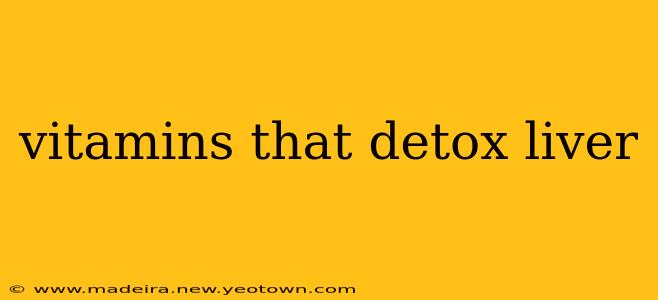The liver, our unsung hero, tirelessly filters toxins from our blood, metabolizes nutrients, and produces essential proteins. But years of exposure to environmental toxins, processed foods, and alcohol can take a toll, leading to sluggish liver function. While there's no magic "liver detox" pill, certain vitamins can significantly support and enhance your liver's natural detoxification processes. This isn't about a quick fix, but about providing your liver with the nutritional support it needs to thrive.
Let's embark on a journey to understand how these vital nutrients contribute to optimal liver health.
What Vitamins Help the Liver Detox?
Several vitamins play crucial roles in supporting liver function and detoxification. Let's explore some key players:
Vitamin A (Retinol and Beta-Carotene)
Vitamin A, both in its preformed (retinol) and precursor (beta-carotene) forms, is essential for maintaining the structure and function of liver cells. Think of it as the liver's building block. It helps regulate gene expression related to liver health and is involved in several detoxification pathways. Finding it in foods like sweet potatoes, carrots, and leafy greens is far preferable to supplementation, unless medically advised.
B Vitamins (Especially B12, B6, and Folate)
The B vitamins are a team of powerhouses when it comes to liver function. They're crucial for various metabolic processes, including those related to detoxification.
- B12 (Cobalamin): Supports the liver's ability to metabolize fats and proteins efficiently. Deficiency can lead to impaired liver function.
- B6 (Pyridoxine): A key player in many enzymatic reactions within the liver, vital for the breakdown and removal of toxins.
- Folate: Essential for cell regeneration and DNA synthesis, supporting the repair of liver cells damaged by toxins. Good sources include spinach, lentils, and fortified cereals.
Vitamin C (Ascorbic Acid)
This potent antioxidant is a champion in protecting liver cells from oxidative stress caused by free radicals. Free radicals damage liver cells and impair detoxification processes. Vitamin C helps neutralize these damaging molecules.
Vitamin E (Tocopherols and Tocotrienols)
Another powerful antioxidant, Vitamin E, acts similarly to Vitamin C, protecting liver cells from damage caused by free radicals and inflammation. Both are excellent in preventing oxidative damage. Think of them as the liver's shields against cellular aggressors.
Vitamin K (Phylloquinone and Menaquinone)
While less directly involved in detoxification than other vitamins, Vitamin K is essential for blood clotting, a vital function affected by liver disease. Ensuring adequate Vitamin K intake contributes to overall liver health.
What Foods Contain Liver-Supporting Vitamins?
Instead of focusing on isolated vitamins, aim to consume a balanced diet rich in whole foods. These foods provide a broader spectrum of nutrients that synergistically support liver health.
- Leafy Green Vegetables: Spinach, kale, and collard greens are packed with vitamins A, C, K, and folate.
- Cruciferous Vegetables: Broccoli, cauliflower, and Brussels sprouts contain compounds that support liver detoxification.
- Citrus Fruits: Oranges, lemons, and grapefruits are excellent sources of vitamin C.
- Sweet Potatoes: A rich source of beta-carotene, a precursor to vitamin A.
- Liver (yes, really!): A surprisingly nutritious source of many essential vitamins and minerals, including B vitamins and Vitamin A. This may not appeal to everyone, but it's certainly nutritionally dense.
- Nuts and Seeds: Almonds, walnuts, and sunflower seeds provide Vitamin E.
Can Too Many Vitamins Harm the Liver?
While vitamins support liver health, excessive intake of certain vitamins, especially fat-soluble vitamins (A, D, E, and K), can be toxic. Always consult a healthcare professional before taking high doses of any vitamin supplements.
Does Taking a Liver Detox Supplement Actually Work?
There's no scientific evidence supporting the effectiveness of "liver detox" supplements. Many such supplements lack rigorous testing and their advertised benefits are often unsubstantiated. A healthy diet and lifestyle choices are far more effective than relying on quick fixes.
What are the Signs of a Poorly Functioning Liver?
Recognizing the signs of a poorly functioning liver is crucial. These can include jaundice (yellowing of the skin and eyes), fatigue, abdominal pain, and swelling in the legs. If you experience any of these symptoms, consult a healthcare professional immediately.
Remember, prioritizing a healthy lifestyle – including a balanced diet, regular exercise, and avoiding excessive alcohol consumption – is the cornerstone of maintaining optimal liver health. Vitamins play a supportive role, but they should be viewed as part of a holistic approach, not a standalone solution. Always consult with a healthcare professional or registered dietitian before making significant dietary changes or starting any supplement regimen, especially if you have pre-existing health conditions.

